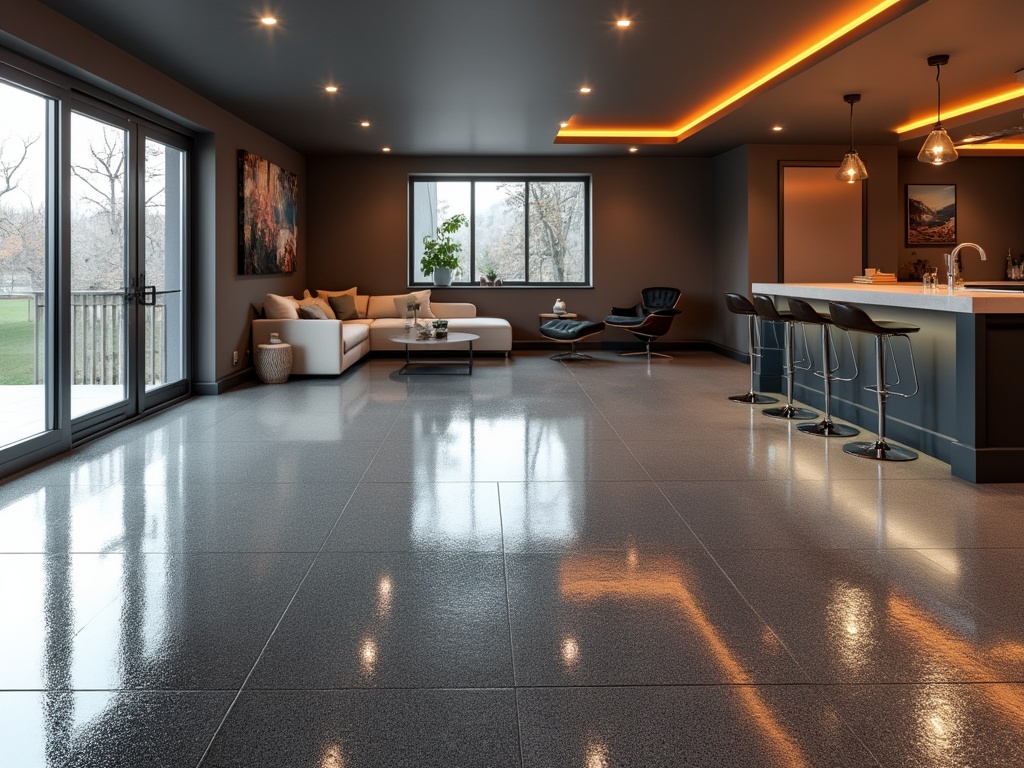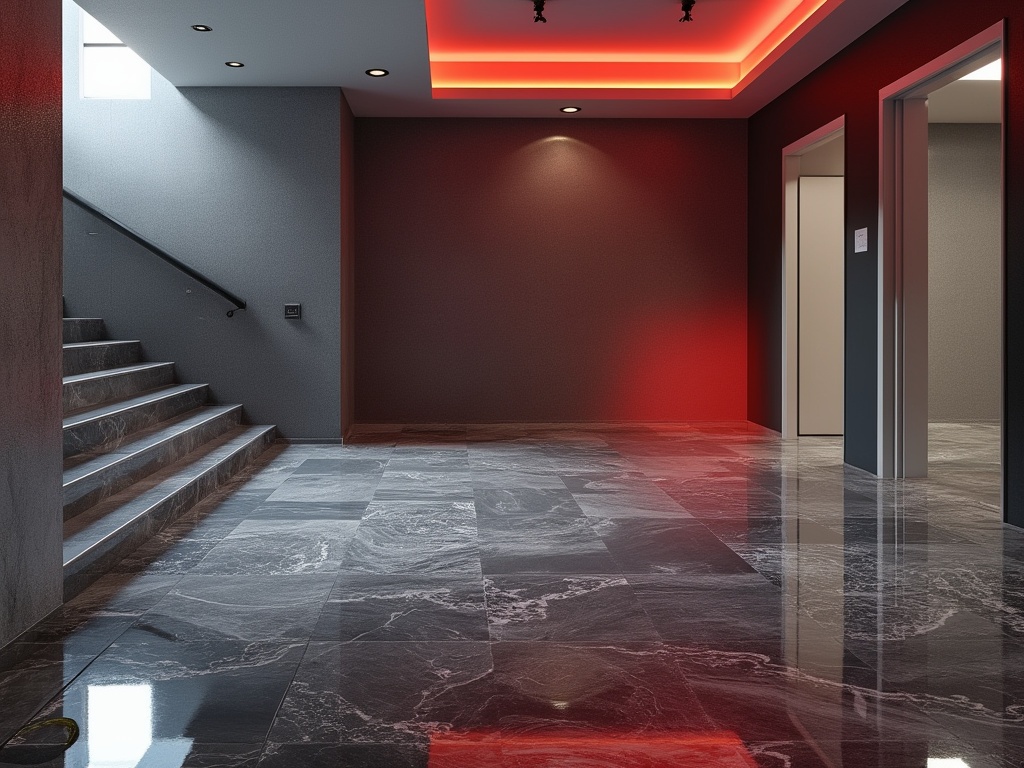
Homeowners in College Station are revolutionizing their unused basement areas with an innovative flooring solution. This cutting-edge option offers a perfect blend of style and practicality, creating seamless surfaces that withstand the region’s humid climate.
Resin coatings provide exceptional durability and moisture resistance, transforming dull spaces into vibrant, functional rooms.
The versatile nature of these finishes allows for personalization, with a wide array of colors and textures available to match any design preference.
Local contractors report a significant increase in requests for this flooring alternative as residents recognize its potential.
The reflective properties of these coatings can brighten basement environments, making them feel more spacious and welcoming. From home gyms to creative workshops, these durable finishes are changing how people utilize their lower-level spaces.
- Resistant to moisture in humid environments
- Customizable colors and textures for unique designs
- Improved brightness and perceived room size
This cost-effective flooring choice not only enhances the aesthetics of basements but also adds value to properties. The chemical-resistant surface withstands heavy use, equipment, and temperature changes, ensuring long-term performance. Homeowners in College Station are discovering that this smart investment offers both immediate benefits and lasting returns.
Click here to learn more about: collegestationepoxy.com
Resin Coatings: Basement Transformation Explained
Transforming subterranean spaces has never been easier with innovative floor solutions. These advanced coverings offer a slipresistant surface that elevates the functionality and appeal of underground areas.
High-performance polymers create a seamless, durable finish when applied to concrete substrates.
Epoxy, polyurethane, and polyaspartic are popular choices for basement applications, each boasting unique characteristics.
The installation process starts with meticulous surface preparation, including thorough cleaning and repair of existing damage.
Skilled professionals then apply the coating in industrialgrade protection layers, often incorporating additives for enhanced safety. The outcome is a sleek, resilient surface that elevates formerly drab basement floors into striking, practical areas.
Key advantages of these coatings for basements include:
- Remarkable durability and longevity
- Excellent moisture resistance and waterproofing
- Simple upkeep and cleaning
- Versatile aesthetics with highgloss shine options
Homeowners can select from an extensive range of custom colors and decorative elements, such as flakes or metallic pigments, to achieve a unique look. Fastcuring systems enable swift installation, reducing disruption to daily routines. While initial expenses may exceed traditional flooring options, the enduring value and enhanced property appeal make these coatings a wise investment for basement upgrades.

Why Choose Seamless Surfaces?
Opting for continuous flooring solutions brings numerous advantages to any space. Epoxy coatings excel in providing impact-resistant surfaces that withstand heavy use and frequent foot traffic.
These uninterrupted floor systems create a visually appealing environment while maximizing the perception of space.
- Strength and Upkeep:
- Epoxy floors boast exceptional durability against impacts and abrasions
- Maintenance is simplified due to the absence of grout lines
- Resistant to stains, chemicals, and thermal shock
- Adaptability and Style:
- Extensive color palette and finish options available
- Ideal for basements, garages, and commercial establishments
- Capable of leveling uneven substrates and adapting to various conditions
- Wellness and Protection:
- Low volatile organic compound emissions enhance indoor air quality
- Inhibits the growth of mold, mildew, and bacteria
- Non-slip additives can be incorporated for increased safety
The long-lasting nature of epoxy flooring translates to reduced maintenance costs and potential property value increase. These uninterrupted surfaces blend functionality with aesthetics, making them suitable for both home and business environments. From transforming basements to providing durable finishes across various spaces, seamless epoxy solutions offer a superior alternative to traditional flooring options.
Epoxy Flooring
- Epoxy floors can withstand up to 10,000 psi of pressure, making them suitable for industrial use
- The global epoxy resin market is projected to reach $64 billion by 2027, indicating growing demand
- Epoxy flooring can last up to 30 years with proper maintenance and care
- Studies show that seamless flooring can reduce cleaning time by up to 70% compared to traditional floors
Durable Finishes For Every Space
Resilient surface treatments enhance the longevity and appeal of various environments. Epoxy applications offer versatile solutions for a wide range of spaces, from homes to commercial facilities.
Residential settings benefit from garage floors with improved durability and aesthetics, while basements gain moisture-resistant and easy-to-clean surfaces.
Patios and pool decks become safer with non-slip, weather-resistant low-VOC finishes.
Commercial spaces also reap the advantages of epoxy coatings. Retail environments enjoy attractive flooring options that require minimal upkeep.
Warehouses rely on heavy-duty coatings to withstand high traffic and heavy loads. Healthcare facilities prioritize hygienic and chemical-resistant surfaces for optimal sanitation.
- Customization options include:
- Various color selections and patterns for branding or aesthetics
- Textured finishes to improve safety and traction
Long-term benefits of epoxy finishes encompass cost-effectiveness compared to traditional materials and reduced maintenance requirements. These durable coatings adapt to diverse environments, providing both functional and aesthetic improvements across residential and commercial spaces. The self-leveling nature of epoxy applications ensures a smooth, seamless surface that is easy to clean and maintain. Antimicrobial properties make these finishes ideal for healthcare settings, while stain-resistant qualities benefit high-traffic areas in commercial and residential spaces.
Chemical-Resistant Flooring Options Compared
Robust flooring solutions offer varying levels of protection and durability in demanding industrial settings. Epoxy coatings excel for their exceptional resistance to harsh substances and longevity.
Professional application ensures optimal performance, while substrate preparation is crucial for adhesion.
Comparing different options helps select the most suitable solution for specific environments.
- Urethane Concrete: Excels in thermal shock resistance and flexibility
- Vinyl Ester Coatings: Superior protection against acids and solvents
- Methyl Methacrylate (MMA) Flooring: Rapid curing and extreme chemical resistance
When selecting flooring, consider:.
- Specific substances present in the environment
- Frequency and duration of exposure
- Budget constraints and long-term cost-effectiveness
Each option offers unique benefits, making it essential to assess your specific needs for optimal mitigation of damage and ensure a durable, long-lasting floor. From residential solutions to industrial applications, the right choice depends on the particular requirements of the space.
Key Facts About Industrial Flooring Solutions
- Epoxy coatings provide exceptional resistance to harsh substances and offer long-term durability
- Proper substrate preparation is crucial for optimal adhesion and performance of industrial flooring
- Urethane concrete excels in thermal shock resistance, while vinyl ester coatings offer superior protection against acids and solvents
- Methyl Methacrylate (MMA) flooring features rapid curing and extreme chemical resistance
Decorative Concrete: Design Possibilities
Innovative epoxy flooring transforms ordinary surfaces into captivating works of art. Property owners can express their unique style through limitless customization options.
Geometric shapes and abstract patterns are achieved through skillful application techniques, while metallic pigments create depth and visual interest.
Solid color designs offer a sleek, modern look with minimal upkeep. 3D illusions and raised patterns add texture and dimension to spaces.
Smooth and textured surfaces can be combined for contrast, enhancing the overall aesthetic appeal. Logos and brand elements quartz broadcast into the floor provide personalization opportunities.
Custom color schemes harmonize with existing decor, creating cohesive environments.
When selecting decorative concrete designs, balancing aesthetics with functionality is important.
Maintenance requirements vary depending on the chosen pattern and finish.
Flake systems that mimic natural stone or terrazzo offer durability in high-traffic areas.
Decorative concrete designs can significantly impact property value, making spaces more attractive to potential buyers or tenants. Current trends in epoxy floor patterns include:
- Metallic effects for a luxurious, flowing appearance
- Flake systems resembling natural stone or terrazzo
- Textured finishes for added safety and visual appeal
These design possibilities allow for seamless integration with various architectural styles and interior design themes. The versatility of decorative concrete extends beyond residential applications to commercial and industrial settings. Topcoat options provide additional protection and enhance the longevity of the finished product.
Moisture Barrier: Essential Or Optional
Epoxy flooring professionals carefully assess substrate conditions before installation. The decision to incorporate a moisture barrier hinges on several factors, requiring thorough evaluation:.
- Substrate condition: Concrete slabs with elevated moisture levels may need nonporous barriers to prevent delamination or bubbling.
- Environmental factors: High-humidity areas or spaces exposed to frequent water contact benefit from additional protection.
- Epoxy formulation: Some products offer enhanced moisture tolerance, potentially reducing the need for separate barriers.
- Budget considerations: While barriers increase initial costs, they can prevent expensive future repairs.
Moisture testing plays a vital role in determining barrier necessity. Some epoxy coatings provide sufficient protection, but chemical bonding between substrate and coating remains essential for optimal performance. The choice to use a moisture barrier should stem from a comprehensive assessment of project requirements and site conditions. As designers explore decorative concrete possibilities, they must also consider how moisture protection impacts the longevity and appearance of their creations. This consideration naturally leads to discussions about safety features, such as slip-resistant solutions, which complement both aesthetic and functional aspects of epoxy flooring systems.
Moisture Barriers in Epoxy Flooring
- Moisture barriers can prevent delamination and bubbling in epoxy floors
- High-humidity environments often require additional moisture protection
- Some epoxy formulations offer enhanced moisture tolerance
- Moisture testing is crucial for determining the need for a barrier
Slip-Resistant Solutions For Safety
Workplace safety hinges on effective traction control measures for flooring systems. Epoxy coatings offer robust solutions to mitigate slip hazards in diverse environments.
Mortar systems and trowel-applied finishes provide exceptional grip, while roll-on and spray-applied options allow for customizable textures.
Thickness options and cure time play pivotal roles in achieving optimal slip resistance without compromising aesthetics or durability.
- Additives enhance traction while preserving visual appeal
- Consistent maintenance ensures lasting slip-resistant properties
- Texture variations accommodate different risk levels and settings
Broadcast systems distribute grit materials evenly across surfaces, creating uniform traction. The selection process considers foot traffic intensity, liquid exposure, and specific industry requirements. Properly implemented solutions safeguard employees and visitors in industrial facilities, commercial spaces, and residential areas. Following moisture barrier installations, these traction-enhancing measures form a comprehensive safety system, paving the way for durable, industrial-grade protection.
Industrial-Grade Protection Cost Breakdown
Comprehensive safeguarding solutions for manufacturing environments come with varying price points. Basic epoxy coatings offer a traffic-ready surface suitable for light industrial use, typically ranging from $3 to $7 per square foot.
More advanced systems with enhanced chemical resistance and loadbearing capabilities can cost between $7 and $12 per square foot, providing superior protection for demanding applications.
High-performance industrial flooring options incorporating static dissipative properties and temperature-resistant formulations may range from $12 to $20 per square foot.
These premium systems often include:.
- Multiple protective layers
- Specialized additives for extreme conditions
- Waterproof membranes for moisture control
- Ecofriendly components for sustainability
Pricing factors include substrate preparation, system thickness, and specific performance requirements. While slip-resistant solutions focus on safety, these robust flooring systems prioritize longevity and durability in harsh industrial settings.
Key Points About Industrial Flooring Solutions
- Basic epoxy coatings cost $3-$7 per square foot for light industrial use
- Advanced systems with enhanced chemical resistance range from $7-$12 per square foot
- High-performance options with static dissipative properties cost $12-$20 per square foot
- Pricing factors include substrate preparation, system thickness, and performance requirements
Industrial Epoxy Coatings Transform College Station Spaces
Garage Floor Epoxy Transforms College Station Spaces
